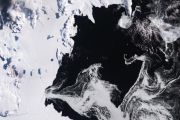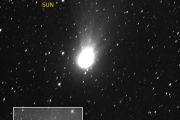
Copernical Team
Understanding gamma rays in our universe through StarBurst
 The U.S. Naval Research Laboratory (NRL), in partnership with NASA's Marshall Space Flight Center (MSFC), has developed StarBurst, a small satellite (SmallSat) instrument for NASA's StarBurst Multimessenger Pioneer mission, which will detect the emission of short gamma-ray bursts (GRBs), a key electromagnetic (EM) signature that will contribute to the understanding of neutron star (NS) mergers.
The U.S. Naval Research Laboratory (NRL), in partnership with NASA's Marshall Space Flight Center (MSFC), has developed StarBurst, a small satellite (SmallSat) instrument for NASA's StarBurst Multimessenger Pioneer mission, which will detect the emission of short gamma-ray bursts (GRBs), a key electromagnetic (EM) signature that will contribute to the understanding of neutron star (NS) mergers. Stargazers marvel at 'Blood Moon', rare total lunar eclipse
 Stargazers across a swathe of the world marvelled at a dramatic red "Blood Moon" during a rare total lunar eclipse in the early hours of Friday morning.
The celestial spectacle was visible in the Americas and Pacific and Atlantic oceans, as well as in the westernmost parts of Europe and Africa.
The phenomenon happens when the Sun, Earth and Moon line up, causing our planet to cast a gian
Stargazers across a swathe of the world marvelled at a dramatic red "Blood Moon" during a rare total lunar eclipse in the early hours of Friday morning.
The celestial spectacle was visible in the Americas and Pacific and Atlantic oceans, as well as in the westernmost parts of Europe and Africa.
The phenomenon happens when the Sun, Earth and Moon line up, causing our planet to cast a gian Exceptional Variability in Blazar BL Lacertae Challenges Classification
 Blazars are a class of active galaxies that direct powerful jets of ionized matter toward Earth. Typically, astronomers categorize them into distinct classes based on the characteristics of their emitted electromagnetic radiation. However, BL Lacertae, a well-studied blazar in the background of the Lacerta (Lizard) constellation, defies this traditional classification system.
Astronomers h
Blazars are a class of active galaxies that direct powerful jets of ionized matter toward Earth. Typically, astronomers categorize them into distinct classes based on the characteristics of their emitted electromagnetic radiation. However, BL Lacertae, a well-studied blazar in the background of the Lacerta (Lizard) constellation, defies this traditional classification system.
Astronomers h NASA Cameras on Blue Ghost Capture First-of-its-Kind Moon Landing Footage
 A team at NASA's Langley Research Center in Hampton, Virginia, has captured first-of-its-kind imagery of a lunar lander's engine plumes interacting with the Moon's surface, a key piece of data as trips to the Moon increase in the coming years under the agency's Artemis campaign.
The Stereo Cameras for Lunar-Plume Surface Studies (SCALPSS) 1.1 instrument took the images during the descent a
A team at NASA's Langley Research Center in Hampton, Virginia, has captured first-of-its-kind imagery of a lunar lander's engine plumes interacting with the Moon's surface, a key piece of data as trips to the Moon increase in the coming years under the agency's Artemis campaign.
The Stereo Cameras for Lunar-Plume Surface Studies (SCALPSS) 1.1 instrument took the images during the descent a Navigating a Slanted River
 Perseverance is hard at work on Mars, overcoming obstacles for scientific exploration! Just a few sols after successfully sealing the challenging Green Gardens core, Perseverance roved on to the Broom Point workspace to collect another sample called Main River. Broom Point is situated a few hundred meters down-slope from where Green Gardens was collected, and the Science Team chose to explore th
Perseverance is hard at work on Mars, overcoming obstacles for scientific exploration! Just a few sols after successfully sealing the challenging Green Gardens core, Perseverance roved on to the Broom Point workspace to collect another sample called Main River. Broom Point is situated a few hundred meters down-slope from where Green Gardens was collected, and the Science Team chose to explore th SwRI-led instrument begins lunar mission to probe Moon's interior
 Shortly after landing on the Moon aboard Firefly Aerospace's Blue Ghost 1 lander on March 2, the Southwest Research Institute-led Lunar Magnetotelluric Sounder (LMS) successfully activated and deployed its five sensors. This groundbreaking instrument is designed to analyze the Moon's subsurface by detecting electric and magnetic field variations, marking the first use of magnetotelluric technolo
Shortly after landing on the Moon aboard Firefly Aerospace's Blue Ghost 1 lander on March 2, the Southwest Research Institute-led Lunar Magnetotelluric Sounder (LMS) successfully activated and deployed its five sensors. This groundbreaking instrument is designed to analyze the Moon's subsurface by detecting electric and magnetic field variations, marking the first use of magnetotelluric technolo Mars Study Suggests Mid-Crust Water May Not Be Essential to Data Interpretation
 More than 3 billion years ago, Mars had episodic liquid water on its surface. However, as the planet lost much of its atmosphere, surface water became unsustainable. The precise fate of this water-whether locked in ice, stored in deep aquifers, incorporated into minerals, or lost to space-remains a subject of ongoing scientific inquiry. This debate has drawn particular attention from Bruce Jakos
More than 3 billion years ago, Mars had episodic liquid water on its surface. However, as the planet lost much of its atmosphere, surface water became unsustainable. The precise fate of this water-whether locked in ice, stored in deep aquifers, incorporated into minerals, or lost to space-remains a subject of ongoing scientific inquiry. This debate has drawn particular attention from Bruce Jakos Norwegian Space Agency partners with Isar Aerospace for satellite launch from Andoya Spaceport
 The Norwegian Space Agency has entered into a contract with European launch service provider Isar Aerospace to deploy its Arctic Ocean Surveillance (AOS) program satellites. Under the agreement, Isar Aerospace's 'Spectrum' launch vehicle will transport two satellites into sun synchronous orbit (SSO) from Andoya Spaceport, Norway's premier orbital launch site.
The launch, scheduled to take
The Norwegian Space Agency has entered into a contract with European launch service provider Isar Aerospace to deploy its Arctic Ocean Surveillance (AOS) program satellites. Under the agreement, Isar Aerospace's 'Spectrum' launch vehicle will transport two satellites into sun synchronous orbit (SSO) from Andoya Spaceport, Norway's premier orbital launch site.
The launch, scheduled to take Hera asteroid mission captures images of Mars moon Deimos
 During a recent flyby of Mars, ESA's Hera mission for planetary defense utilized its scientific payload beyond Earth and the Moon for the first time. The spacecraft activated a suite of instruments to capture images of Mars' surface and Deimos, the smaller and lesser-known of its two natural satellites.
Hera, launched on October 7, 2024, is en route to study the first asteroid to have its
During a recent flyby of Mars, ESA's Hera mission for planetary defense utilized its scientific payload beyond Earth and the Moon for the first time. The spacecraft activated a suite of instruments to capture images of Mars' surface and Deimos, the smaller and lesser-known of its two natural satellites.
Hera, launched on October 7, 2024, is en route to study the first asteroid to have its Earth from Space: Halong Bay, Vietnam
 Image:
This Copernicus Sentinel-2 image showcases striking rocky formations amid the blue waters of Halong Bay in northeast Vietnam.
Image:
This Copernicus Sentinel-2 image showcases striking rocky formations amid the blue waters of Halong Bay in northeast Vietnam. 





























